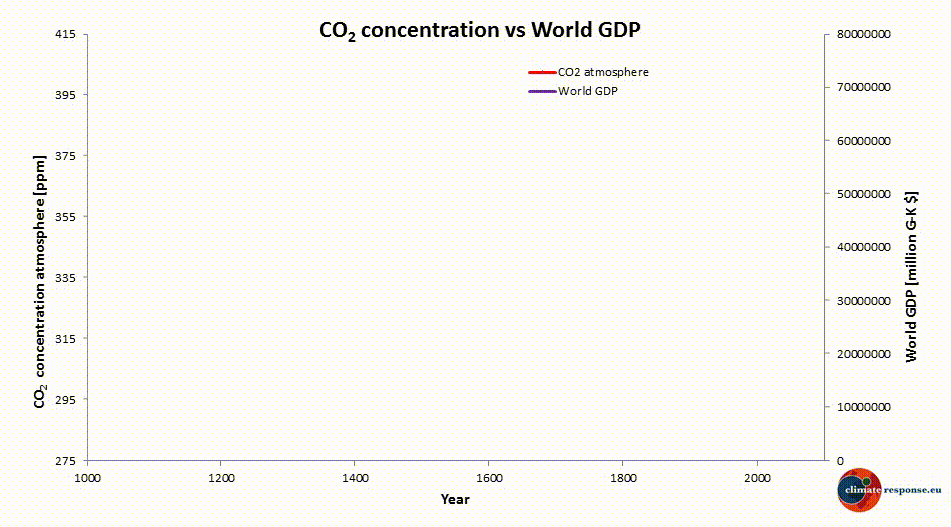What can Science & Technology do about Climate Change?
Scientific & Technological inventions are being produced at a rate never seen before. The world we live in, is hardly recognizable from the world our grandparents lived in. We communicate and trade with the other side of the world with goods crossing the globe in a matter of days.
From time to time stories emerge about new inventions that might just save us from Climate Change.
Is science by itself capable of combatting Climate Change? And if so, will it do so in time?
This page answers these questions.
Science & Technology
Science & Technology has increased enormously since the Industrial Revolution in the 1800's and has really flourished during the last decades.
In recent times Science has allowed us an incredible progress in understanding the world we live in. At the same time Technology has given us an enormous toolbox which can contribute to making our life easier and more comfortable.
In the last 60 years, the following has happened:
World Population: from 2.5 billion to 7.5 billion
World Life Expectancy: from < 50 to 70 years
Extreme poverty: from 70% to <10%
World Literacy: Increased from 35% to 85%
World GDP per person: <450 $ to > 10 000 $

Source - Science Magazine
What CAN be done by Science & Technology?
Source - Ourworldindata.org

Aside from the clear improvements Science & Technology has brought on average to global society, the prosperity it enabled, unfortunately went hand in hand with an exponential increase in consumption of goods and energy, emitting the greenhouse gases which cause Climate Change.
During the last decades, Science & Technology has also been directed in reducing the environmental impact on modern consumption society. Most notable are the advancements in Renewable Energies. Unfortunately, so far, the efforts have not been successful in any way in reducing the total amount of GHG emitted.
For more information on Renewable Energies and Climate Change, please visit our following page:

What has been done?
Energy Efficiency
Science & Technology succeeded in making our society more prosperous in a large way by changing or improving the way goods are being produced. The increase in efficiency lowered the production cost and the cost for the consumer, allowing him to get more for his money.
Increases in efficiency due to technological advancements occurred in about every possible field. Examples of efficiency increases since the 1970's in day-to-day uses include the following:
-
Refrigerator energy consumption has decreased by 75 %
-
Housing energy cost per m2 has decreased by 25 %
-
Car fuel consumption per km has decreased by 50 %
-
Car CO₂ emission per km has decreased by 50 %
Unfortunately, these improvements have not decreased the total amount of energy consumed, as consumption has continued to grow, in part due to exactly the fact that many products have become cheaper and more easily accessible .
Renewable Energies
In the light of Climate Change, the need for low carbon energy production is more imminent than ever. Indeed, Renewable Energies emit on average >95% less energy than fossil fuels. Therefore, Science & Technology has made a lot of progress in the development and implementation of Renewable Energies in the last years.
-
Renewables emit > 95 % less CO2 per unit of energy
-
Price of Solar Energy dropped by 99 % since 1977
-
Total Renewable Energy increased by 100 % since 2008
For more information on Renewable Energies, please visit our Renewable Energy page:

Source - Greater Auckland

As illustrated in the previous section, Science & Technology can be a very strong force for change in our lives. In the last decades, it has secured a level of wealth to more people than ever before in history.
Unfortunately, with that increased wealth came a strong increase in consumption and pollution.
Despite the enormous investment of energy and resources in environmental sciences, the amount of greenhouse gases (GHG) emitted has never been higher.
This highlights the limits of Science & Technology. They are an extremely powerful tool with which we can shape society, but they do not make any moral judgement or have any direction by themselves.
Science can be used to develop both medicines/drugs and weapons. It is society which decides in which direction it wields this powerful tool.
Increasing growth and prosperity have been the major goal of our modern society, Science & Technology have been used mainly for this purpose. And as the increased prosperity went hand in hand with GHG emissions, it is not surprising that Science & Technology on themselves have not succeeded in reducing emissions so far.
As illustration, since the 1970s:
-
Refrigerator energy consumption has decreased by 75 %
Refrigerator production in China has increased by 400%
-
Housing energy cost per m2 has decreased by 25 %
World energy consumption has increased by 135%
-
Car fuel consumption per km has decreased by 50 %
World car production has increased by 600%
While recently some indicators show that in time a decoupling of growth and GHG emissions could be possible, so far, despite the enormous progress in Science & Technology, this has not been the case.

What CANNOT be done by Science?

Source - University of Berkley
Source - Prof. Gustave Speth




Sources:
Source - University of Berkley
Source - Gustave Speth - Professor - Oxford University
Source - SlidePlayer
Source - The Guardian
Source - Worldwatch Institute
Source - OurWorld in Data
Source - prof. Sharon Beder - University of Wollongong
Source - Scientific American
Source - prof. Nicholas Agar - University of Wellington
Source - CarbonBrief
